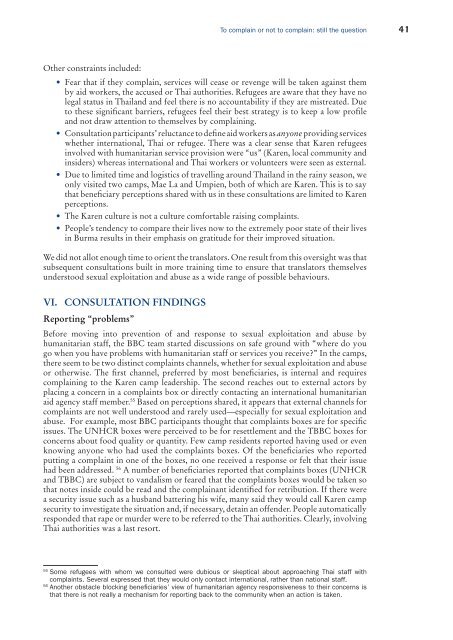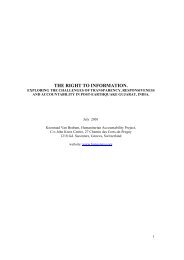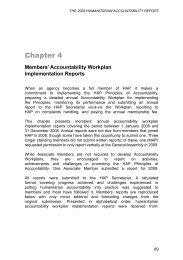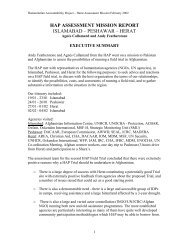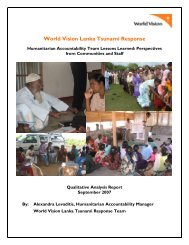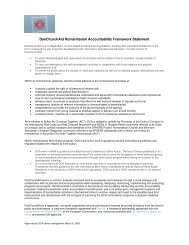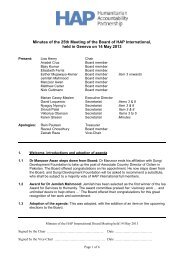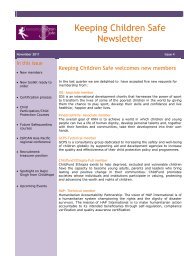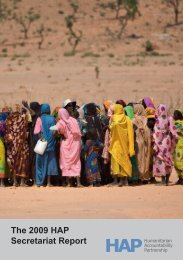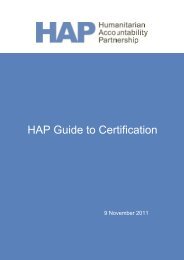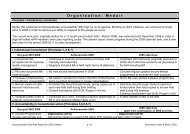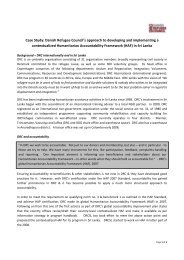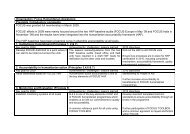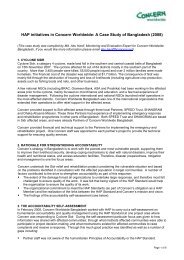TO COMPLAIN OR NOT TO COMPLAIN: STILL THE QUESTION ...
TO COMPLAIN OR NOT TO COMPLAIN: STILL THE QUESTION ...
TO COMPLAIN OR NOT TO COMPLAIN: STILL THE QUESTION ...
Create successful ePaper yourself
Turn your PDF publications into a flip-book with our unique Google optimized e-Paper software.
To complain or not to complain: still the question<br />
41<br />
Other constraints included:<br />
• Fear that if they complain, services will cease or revenge will be taken against them<br />
by aid workers, the accused or Thai authorities. Refugees are aware that they have no<br />
legal status in Thailand and feel there is no accountability if they are mistreated. Due<br />
to these significant barriers, refugees feel their best strategy is to keep a low profile<br />
and not draw attention to themselves by complaining.<br />
• Consultation participants’ reluctance to define aid workers as anyone providing services<br />
whether international, Thai or refugee. There was a clear sense that Karen refugees<br />
involved with humanitarian service provision were “us” (Karen, local community and<br />
insiders) whereas international and Thai workers or volunteers were seen as external.<br />
• Due to limited time and logistics of travelling around Thailand in the rainy season, we<br />
only visited two camps, Mae La and Umpien, both of which are Karen. This is to say<br />
that beneficiary perceptions shared with us in these consultations are limited to Karen<br />
perceptions.<br />
• The Karen culture is not a culture comfortable raising complaints.<br />
• People’s tendency to compare their lives now to the extremely poor state of their lives<br />
in Burma results in their emphasis on gratitude for their improved situation.<br />
We did not allot enough time to orient the translators. One result from this oversight was that<br />
subsequent consultations built in more training time to ensure that translators themselves<br />
understood sexual exploitation and abuse as a wide range of possible behaviours.<br />
VI. CONSULTATION FINDINGS<br />
Reporting “problems”<br />
Before moving into prevention of and response to sexual exploitation and abuse by<br />
humanitarian staff, the BBC team started discussions on safe ground with “where do you<br />
go when you have problems with humanitarian staff or services you receive?” In the camps,<br />
there seem to be two distinct complaints channels, whether for sexual exploitation and abuse<br />
or otherwise. The first channel, preferred by most beneficiaries, is internal and requires<br />
complaining to the Karen camp leadership. The second reaches out to external actors by<br />
placing a concern in a complaints box or directly contacting an international humanitarian<br />
aid agency staff member. 55 Based on perceptions shared, it appears that external channels for<br />
complaints are not well understood and rarely used—especially for sexual exploitation and<br />
abuse. For example, most BBC participants thought that complaints boxes are for specific<br />
issues. The UNHCR boxes were perceived to be for resettlement and the TBBC boxes for<br />
concerns about food quality or quantity. Few camp residents reported having used or even<br />
knowing anyone who had used the complaints boxes. Of the beneficiaries who reported<br />
putting a complaint in one of the boxes, no one received a response or felt that their issue<br />
had been addressed. 56 A number of beneficiaries reported that complaints boxes (UNHCR<br />
and TBBC) are subject to vandalism or feared that the complaints boxes would be taken so<br />
that notes inside could be read and the complainant identified for retribution. If there were<br />
a security issue such as a husband battering his wife, many said they would call Karen camp<br />
security to investigate the situation and, if necessary, detain an offender. People automatically<br />
responded that rape or murder were to be referred to the Thai authorities. Clearly, involving<br />
Thai authorities was a last resort.<br />
55<br />
Some refugees with whom we consulted were dubious or skeptical about approaching Thai staff with<br />
complaints. Several expressed that they would only contact international, rather than national staff.<br />
56<br />
Another obstacle blocking benefi ciaries’ view of humanitarian agency responsiveness to their concerns is<br />
that there is not really a mechanism for reporting back to the community when an action is taken.


